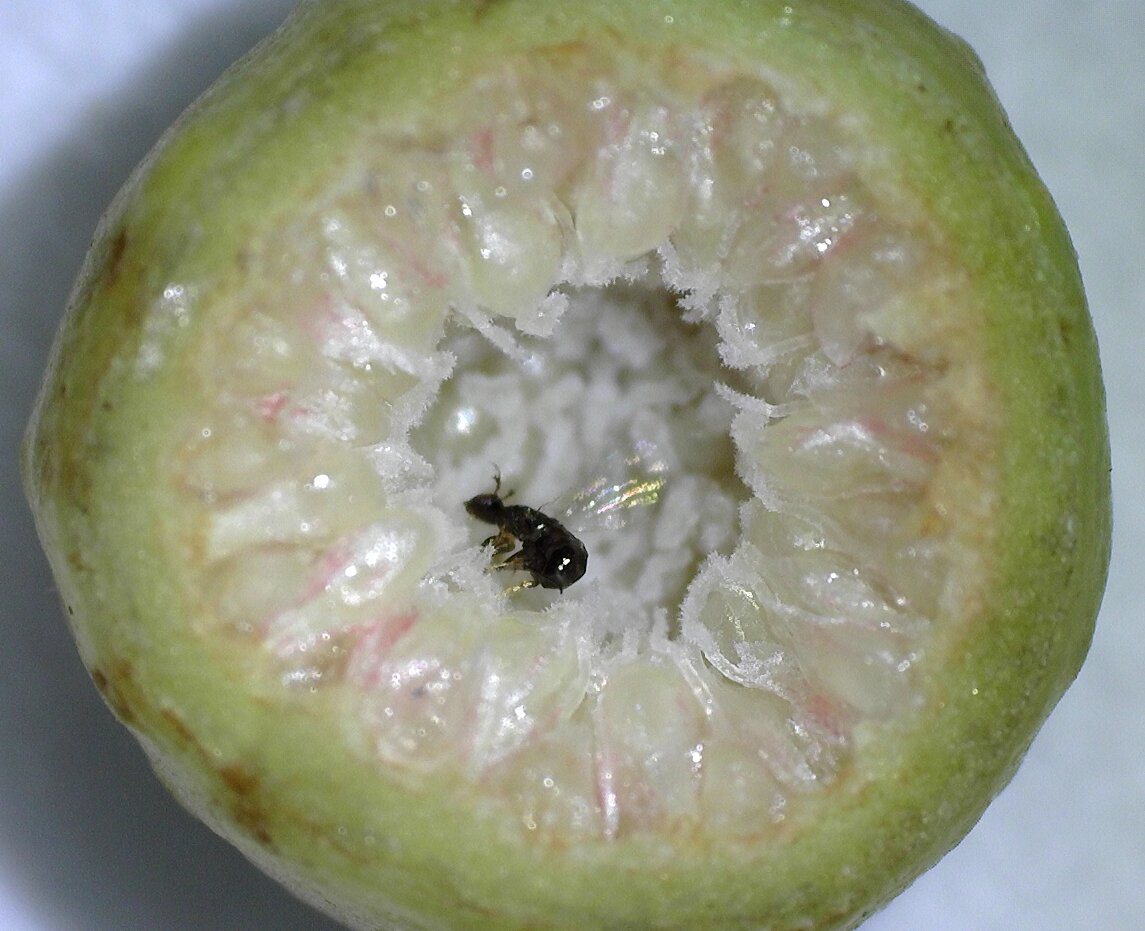In a new study published in PNAS, researchers from the Xishuangbanna Tropical Botanical Garden (XTBG) of the Chinese Academy of Sciences (CAS), the Smithsonian Tropical Research Institute (STRI), Republic of Panama, and their Swedish collaborators discovered that the lack of sanctions in local hosts promotes the loss of specialized morphologies and behaviors crucial for pollination and, thereby, the evolution of cheating in fig-wasp mutualism.
Figs have an obligate mutualism with tiny fig-pollinating wasps. When the female flowers inside the immature fruit are ready for pollination, the fig emits an enticing aroma that attracts only female wasps of the specific type for that tree. The wasp finds the fig by its scent and struggles to get inside via the small opening at the end of the fig.
Previous experiments have shown that wasps that do not pollinate (P?) have lower fitness than wasps that pollinate (P+) due to increased rates of fig abortion (i.e., killing all wasp larvae) and increased larval mortality, thus reducing the number of P? offspring that emerge. These “host sanctions,” i.e., differential resource allocation to more beneficial symbionts, are likely caused by selective resource allocation by the tree to better-pollinated figs.
To explore whether the “host sanction” is necessary to maintain the mutually beneficial interactions between figs and fig wasps, the researchers exploited the mutualistic active pollinator, Eupristina verticillata, and a congeneric cheater species, Eupristina sp., co-occurring on the same monoecious host fig.
They compared the reproductive biology of Eupristina verticillata, the primary pollinator of Ficus microcarpa in and near XTBG, and that of the closely related species Eupristina sp., which co-occurs on their shared host, using behavioral, morphological, phylogenetic and experimental studies.
The researchers found that Eupristina verticillata is a competent pollinator associated with high seed sets. In sharp contrast, however, the undescribed Eupristina sp. is not a pollinator but a cheater (i.e., an individual not providing a beneficial service to its partners) toward Ficus microcarpa because it fails to efficiently pollinate its host while imposing significant costs on the host.
Moreover, they found that the developing cheater offspring add insult to injury by costing the host in lost pollen dispersal (i.e., reduced male fitness).
“Despite dramatically different effects on their host, Eupristina verticillata and Eupristina sp. are very closely related, probably sister taxa,” said Edward Allen Herre from STRI.
In addition, the researchers found that the cheater Eupristina sp. consistently produced significantly more offspring than the pollinator, apparently as a result of higher oviposition. “The cheater has evolved from a mutualist ancestor to become a parasite on this host. This evolution occurred independently from the case that has been previously described in wasps associated with the closely related fig Ficus altissima,” said Prof. PENG Yanqiong from XTBG.
The researchers suggested that the reason that cheating in fig wasps appears to be rare is that most host fig species exhibit effective host sanctions. They also suggested that the rarity of the loss of pollination behaviors and morphologies that lead to the evolution of cheating should be considered from the perspective of the host’s response, i.e., the presence and strength of “host sanctions.”
This study demonstrated that sanctions enforce cooperation in fig-wasp mutualism.
Contact
PENG Yanqiong Ph.D Principal Investigator
Key Laboratory of Tropical Forest Ecology, Xishuangbanna Tropical Botanical Garden, Chinese Academy of Sciences, Mengla, Yunnan 666303, China
E-mail: pengyq@xtbg.ac.cn

A cheater wasp (Eupristina sp.) laying eggs in a receptive fig of her host F. microcarpa. (Image by ZHANG Ting)

